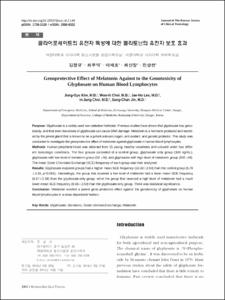글라이포세이트의 유전자 독성에 대한 멜라토닌의 유전자 보호 효과
- Keimyung Author(s)
- Lee, Jae Ho; Jin, Sang Chan; Choi, Woo Ik; Choi, In Jang
- Journal Title
- 대한임상독성학회지
- Issued Date
- 2016
- Volume
- 14
- Issue
- 2
- Keyword
- Glyphosate; Genotoxic; Sister chromatid exchange; Melatonin
- Abstract
- Purpose: Glyphosate is a widely used non-selective herbicide. Previous studies have shown that glyphosate has genotoxicity,
and that even low-doses of glyphosate can cause DNA damage. Melatonin is a hormone produced and secreted
by the pineal gland that is known to be a potent anti-carcinogen, anti-oxidant, and genetic protector. This study was
conducted to investigate the genoprotective effect of melatonin against glyphosate in human blood lymphocytes.
Methods: Human peripheral blood was obtained from 15 young, healthy volunteers and cultured under four different
toxicologic conditions. The four groups consisted of a control group, glyphosate only group (300 ng/mL),
glyphosate with low level of melatonin group (50 μM), and glyphosate with high level of melatonin group (200 μM).
The mean Sister Chromatid Exchange (SCE) frequency of each group was then analyzed.
Results: Glyphosate exposed groups had a higher mean SCE frequency (10.33±2.50) than the control group (6.78
±2.31, p<0.001). Interestingly, the group that received a low-level of melatonin had a lower mean SCE frequency
(8.67±2.58) than the glyphosate-only group, while the group that received a high level of melatonin had a much
lower mean SCE frequency (8.06±2.50) than the glyphosate-only group. There was statistical significance.
Conclusion: Melatonin exerted a potent gene protective effect against the genotoxicity of glyphosate on human
blood lymphocytes in a dose-dependent fashion.
- Alternative Title
- Genoprotective Effect of Melatonin Against to the Genotoxicity of Glyphosate on Human Blood Lymphocytes
- Publisher
- School of Medicine
- Citation
- 김정규 et al. (2016). 글라이포세이트의 유전자 독성에 대한 멜라토닌의 유전자 보호 효과. 대한임상독성학회지, 14(2), 144–150. doi: 10.22537/jksct.14.2.144
- Type
- Article
- ISSN
- 1738-1320
- Appears in Collections:
- 1. School of Medicine (의과대학) > Dept. of Anatomy (해부학)
1. School of Medicine (의과대학) > Dept. of Emergency Medicine (응급의학)
- 파일 목록
-
-
Download
 oak-2017-0485.pdf
기타 데이터 / 113.33 kB / Adobe PDF
oak-2017-0485.pdf
기타 데이터 / 113.33 kB / Adobe PDF
-
Items in Repository are protected by copyright, with all rights reserved, unless otherwise indicated.